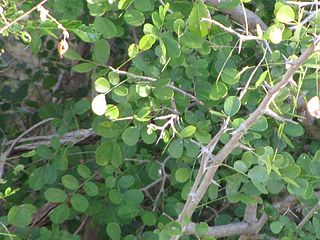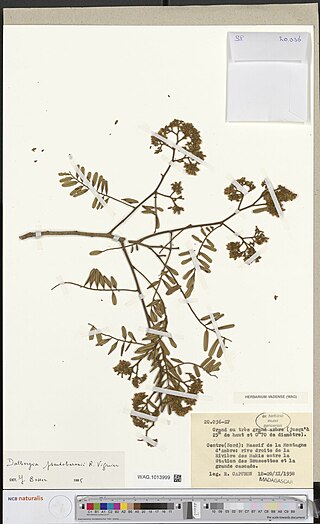
Dalbergia melanoxylon in french Granadille d'Afrique is a flowering plant in the family Fabaceae, native to seasonally dry regions of Africa from Senegal east to Eritrea and south to the north-eastern parts of South Africa. The tree is an important timber species in its native areas; it is used in the manufacture of musical instruments and fine furniture. Populations and genomic resources for genetic biodiversity maintenance in parts of its native range are threatened by overharvesting due to poor or absent conservation planning and by the species' low germination rates.
Dalbergia acariiantha is a species of legume in the family Fabaceae. It is found only in Tanzania.
Dalbergia baronii is a species of flowering plant in the legume family Fabaceae. It is endemic to Madagascar. It is named after the English missionary and botanist Rev. Richard Baron.
Dalbergia chlorocarpa is a species of legume in the family Fabaceae. It is found only in Madagascar. It is threatened by habitat loss.
Dalbergia emirnensis is a species of legume in the family Fabaceae. It is found only in Madagascar. It is threatened by habitat loss.
Dalbergia greveana is a species of legume in the family Fabaceae.
Dalbergia hildebrandtii is a species of legume in the family Fabaceae. It is found only in Madagascar. It is threatened by habitat loss.

Dalbergia madagascariensis is a species of legume in the family Fabaceae. It is found only in Madagascar. It is threatened by habitat loss.
Dalbergia monticola is a species of flowering plant in the legume family Fabaceae. It is endemic to Madagascar. It occurs at higher elevation, which gave the species its name.
Dalbergia neoperrieri is a species of legume in the family Fabaceae. It is found only in Madagascar. It is threatened by habitat loss.

Dalbergia peltieri is a species of legume in the family Fabaceae. It is found only in Madagascar. It is threatened by habitat loss.

Dalbergia pervillei is a species of legume in the family Fabaceae. It is found only in Madagascar. It is threatened by habitat loss.

Dalbergia pseudobaronii is a species of flowering plant in the legume family Fabaceae. It is endemic to Madagascar. Its leaves are similar to those of Dalbergia baronii, which gave the species its name.

Dalbergia purpurascens is a species of legume in the family Fabaceae.
Dalbergia suaresensis is a species of legume in the family Fabaceae, and is unique because it is only found in Madagascar. The plant's conservation status is listed as "endangered", and its continued existence on this planet is threatened by habitat loss.
Dalbergia tsiandalana is a species of legume in the family Fabaceae. It is found only in Madagascar. It is threatened by habitat loss.
Dalbergia urschii is a species of legume in the family Fabaceae. It is found only in Madagascar. Trees of dalbergia urschii are often harvested for lumber, due to the high quality and unique color of its wood.
Dalbergia viguieri is a species of legume in the family Fabaceae. It is found only in Madagascar. It is threatened by habitat loss.

Dalbergia retusa is a plant species in the genus Dalbergia found in Pacific regions of Central America, ranging from Panama to southwestern Mexico. It produces the cocobolo wood. It is a fair-sized tree, reported to reach 20–25 m in height. This is probably the species contributing most of the wood in the trade. Because of the wood's great beauty and high value, the trees yielding this wood have been heavily exploited and are now rare outside national parks, reserves, and plantations.
Dalbergia occulta is a species of flowering plant in the legume family Fabaceae. It is endemic to Madagascar. Its original description was based on a single collection, which explains its botanical name.








